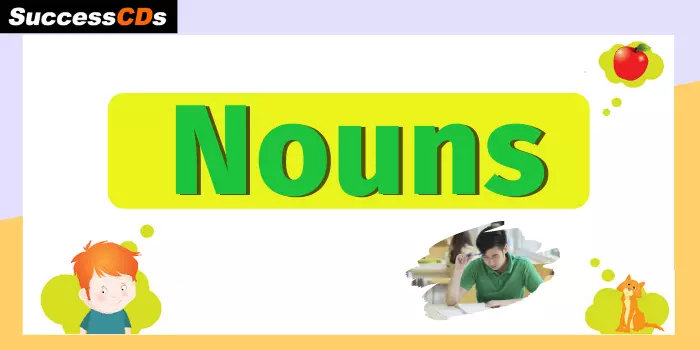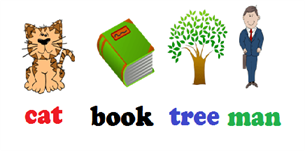
Noun Definition and Types in English Grammar with Excercise and Examples Explained in Hindi
This article includes definitions, types of nouns and example sentences. All this is simultaneously explained in Hindi and English for better understanding. The lesson is followed by exercises based on nouns and types of nouns. There is a video explanation attached too.
Table of Contents
FOR A DETAILED EXPLANATION OF NOUNS, SEE THE VIDEO
Noun Definition
A word that is the name of a person, animal, place, thing, quality, idea, and is typically used in a sentence as subject or object of a verb or as an object of a preposition.
Nouns are also called ‘naming words’.
संज्ञा
किसी व्यक्ति, वस्तु, जीव, स्थान या विचार को संभोदित करने वाले शब्द को संज्ञा कहते हैं। जो शब्द कर्ता को दर्शाते हैं, वे संज्ञा कहलाते हैं।
Related
- Determiners, Use, Exercise and Examples
- All About Tenses, Types of Tenses in English Grammar with Examples
- Direct and Indirect Speech, Format, Examples
- Subject verb Agreement, Definition, Examples
Noun Examples
Let us see some examples of nouns –
संज्ञा के उदाहरण
Mahatma Gandhi | महात्मा गांधी | India | भारत |
Boy | लड़का | Tree | पेड़ |
Student | विद्यार्थी | Crowd | भीड़ |
Honesty | ईमानदारी | Beauty | सौंदर्य |
Noun Types | 4 Types of Noun
Nouns are of four types as follows –
संज्ञा के प्रकार
- Common noun जातिवाचक संज्ञा
- Proper noun व्यक्तिवाचक संज्ञा
- Collective noun समूहवाचक संज्ञा
- Abstract noun भाववाचक संज्ञा
Let us discuss them one by one –

1. Common noun (जातिवाचक संज्ञा)
Names of persons or things in general are called common noun.
सभी व्यक्तियों या वस्तुओं के सामान्य नाम।
Examples of common nouns

boy | लड़का | girl | लड़की |
tree | पेड़ | bus | बस |
book | किताब | building | इमारत |
ship | जहाज | man | पुरुष |
owner | मालिक | beggar | भिखारी |
servant | नौकर | child | बच्चा |
husband | पति | neighbour | पड़ोसी |
father | पिता | temple | मंदिर |
morning | सुबह | evening | शाम |
food | भोजन | infant | शिशु |
Common noun example sentences
He goes to school.
वह स्कूल जाता है।
My father is a teacher.
मेरे पिताजी अध्यापक हैं।
I am reading a book.
मैं किताब पढ़ रहा हूँ।
My mother is cooking food.
मेरी माँ भोजन पका रही है।
2. Proper noun (व्यक्तिवाचक संज्ञा)
The name of a particular person, place, animal or thing is called a proper noun.
किसी एक विशेष व्यक्ति, वस्तु, स्थान या जीव का नाम
Examples of proper nouns
-min.png)
Ganga | गँगा | Delhi University | दिल्ली विष्वविद्यालय |
Hari | हरी | Shatabdi Express | शताब्दी एक्सप्रेस |
Taj Mahal | ताज महल | Isaac Newton | इसाक न्यूटन |
Jawaharlal Nehru | जवाहरलाल नेहरू | Chandigarh | चंडीगढ़ |
France | फ्राँस | Qutab Minar | क़ुतुब मिनार |
Proper noun example sentences
जवाहर लाल नेहरू भारत के पहले प्रधान मंत्री थे।
Jawaharlal Nehru was the first prime minister of India.
पैरिस फ्रांस की राजधानी है।
Paris is the capital of France.
हम शाहरुख़ खान से मिले थे।
We met Shahrukh Khan.
वे दिल्ली विश्वविद्यालय में पढ़ते हैं।
They study at the Delhi University.
राधिका विश्व यात्रा पर जा रही है।
Radhika is going on a world tour.
हम दी ट्रिब्यून पढ़ते हैं।
We read The Tribune.
Learn More
- English Vocabulary for Bank PO Exams – Synonyms MCQ Videos
- Future Perfect Tense- Definition, Examples, Types, Exercise
- Past Perfect Tense – Definition, Formula, Examples, Exercises
- Prepositions of Motion – Definition, Examples, Exercises – in Hindi
- Present perfect continuous tense – Structure, Examples, Exercises
- Pronouns – Definition, Examples, Types, Exercises
- Singular and Plural nouns – Definition, List, Examples, Exercises
3. Collective noun (समूहवाचक संज्ञा )
The name of a group of persons, places, animals or things is called a collective noun.
जो शब्द व्यक्तियों या वस्तुओं के समूह का समुदायक रूप से वर्णन करें।
Examples of collective nouns
-min.png)
army | सेना दल | committee | कमेटी |
class | कक्षा | government | सरकार |
public | जनता | crowd | भीड़ |
nation | राष्ट्र | fleet | बेड़ा |
parliament | संसद |
Collective noun example sentences
सरकार गरीबों के हित मैं है।
The government is in favour of the poor.
जहाज़ों का बेडा समुद्र तट पर पहुँच गया।
The fleet of ships has reached the coast.
सेना दल ने दुश्मन को हरा दिया।
The army defeated the enemy.
डकैतों का गिरोह पकड़ा गया।
The gang of dacoits has been caught.
4. Abstract noun (भाववाचक संज्ञा)
A noun denoting an idea, quality, or state rather than a concrete object is called an abstract noun.
किसी व्यक्ति या वस्तु के गुण, कर्म या अवस्था का बोध करने वाले शब्द
Examples of abstract nouns
-min.png)
laughter | हंसी | sickness | बिमारी |
success | कामयाबी | depth | गहराई |
beauty | सुन्दरता | slavery | गुलामी |
childhood | बचपन | truth | सच्चाई |
Abstract noun example sentences
भारत को १९४७ में स्वतंत्रता मिली।
India got freedom in 1947.
मैं बचपन में टॉफ़ी खाता था।
I ate toffee during childhood.
सूर्योदय का नज़ारा बहुत सुन्दर होता है।
The sight of sunrise is beautiful.
राम का भाई गुलामी में रहता है।
Ram’s brother lives in slavery.
Nouns Exercise
Identify the noun and its type in the following sentences. The correct answers follow –
1. The Chinese army adopted cleverness to win the war and occupy India’s territory.
चीनी सेना दल ने चालाकी से युद्ध जीत कर भारत की जमीन पर कब्ज़ा कर लिया।
2. Teacher took the students to visit the historical and political buildings of New Delhi like Red Fort, Rashtrapati Bhawan, India gate, etc.
अध्यापिका विद्यार्थियों को नई दिल्ली की ऐतिहासिक और राजनैतिक इमारतें जैसे की लाल किला , राष्ट्रपति भवन, इंडिया गेट , वगैरह देखने ले गई।
Answers
1. The Chinese army adopted cleverness to win the war and occupy India’s territory.
Chinese – Proper noun
Army – Collective noun
Cleverness – Abstract noun
War – common noun
India – Proper noun
Territory – common noun

2. Teacher took the students to visit the historical and political buildings of New Delhi like Red Fort, Rashtrapati Bhawan, India gate, etc.
Teacher – Common noun
Students – common noun
Historical – abstract noun
Political – abstract noun
Buildings – common noun
New Delhi – Proper noun
Red Fort – Proper noun
Rashtrapati Bhawan – Proper noun
India Gate – Proper noun




Learn More
- Future Continuous Tense – Definition, Exercise
- Exercises on Nouns Rules (True or False), Nouns Exercises
- Simple Future Tense – Definition, Exercise
- Past perfect continuous Tense – Definition, Exercises
- Active and Passive voice – Definition, Examples, Exercises – in Hindi
- Antonyms MCQs – English Vocabulary for Bank Po Exams
- Conjunction – Definition, Types, Examples, Exercises – in Hindi
- Direct and Indirect speech – Definition, Rules, Examples, Exercises
- Future Perfect Continuous Tense- Definition, Examples, Types, Exercise